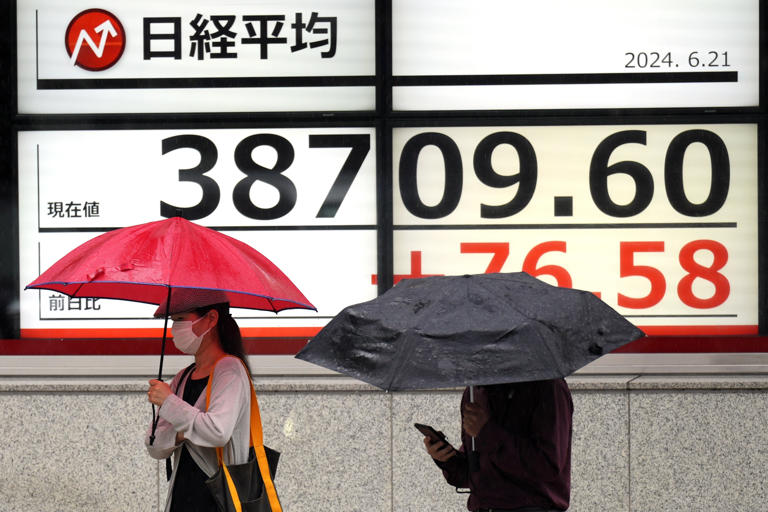Asian markets mostly traded lower on Friday following a downturn on Wall Street, where a significant drop in Nvidia’s stock dragged the broader market down. In Japan, the Nikkei 225 index ended nearly flat, down by less than 0.1% to close at 38,596.47. This came after the government reported an increase in the inflation rate to 2.5% in May from 2.2% in April, marking the first rise in three months. The increase in inflation suggests potential adjustments in monetary policy by the Bank of Japan, as market analysts keep a close watch on upcoming data to gauge the likelihood of a rate hike in September.
Yeap Jun Rong, a market analyst at IG, noted that the upcoming data before the next Bank of Japan meeting will be crucial to determine if the market’s anticipation of a potential rate hike in September is justified. This cautious sentiment was reflected in the market’s subdued performance.
In other Asian markets, Australia’s S&P/ASX 200 rose 0.3% to 7,796.00, buoyed by gains in the financial and mining sectors. In contrast, South Korea’s Kospi declined by 0.8% to 2,784.26, pressured by losses in technology stocks. Hong Kong’s Hang Seng index dropped by 1.6% to 18,039.40, and the Shanghai Composite fell by 0.2% to 2,998.14, as concerns about China’s economic recovery weighed on investor sentiment.
On Thursday in the U.S., the S&P 500 dropped 0.3% from a recent all-time high, closing at 5,473.17. The Nasdaq composite retreated from its record, slipping 0.8% to 17,721.59, while the Dow Jones Industrial Average rose by 0.8% to 39,134.76.
Nvidia’s stock, which has been a major beneficiary of the AI boom, fell 3.5%, ending an eight-week winning streak. The company’s shares experienced a significant intraday swing, resulting in a loss of nearly $246 billion in market capitalization, according to Dow Jones Market Data. This volatility came after Nvidia briefly surpassed Microsoft to become the most valuable company in the market, only to cede the top spot back to Microsoft. Despite the recent dip, Nvidia’s stock has surged by 164% this year. The company’s chips are integral to the AI technology sector, which is expected to drive significant growth in productivity and profits.
Accenture, a consulting and professional services company, saw its shares rise by 7.3% despite reporting weaker-than-expected profit and revenue for the latest quarter. The company highlighted its success in securing over $900 million in new bookings for generative AI in the latest quarter, bringing the total to $2 billion over the past three quarters. This illustrates the strong demand for AI-related services and the potential for significant revenue growth in this sector.
The substantial gains in Nvidia and other AI-related stocks have helped buoy the overall stock market despite economic weaknesses in the U.S. High interest rates aimed at curbing inflation have adversely affected the housing market and manufacturing sectors, and lower-income households are struggling with rising prices. The robust performance of these technology stocks has offset some of the negative impacts from other sectors.
In the bond market, Treasury yields edged higher following mixed economic reports. Initial jobless claims decreased but not as much as anticipated, and manufacturing in the mid-Atlantic region grew at a slower-than-expected pace. Meanwhile, new home construction fell short of expectations. A slowdown in the U.S. economy could alleviate inflationary pressures and potentially lead the Federal Reserve to lower interest rates later this year, which would relieve some economic stress and boost investment prices. Fed officials have hinted at the possibility of one or two rate cuts this year, while many Wall Street traders expect even more cuts.
The yield on the 10-year Treasury note increased to 4.25% from 4.22%, and the two-year yield, which is more aligned with Fed expectations, rose to 4.73% from 4.71%. Higher yields indicate increased demand for safer investments amid economic uncertainty.
In energy markets, U.S. benchmark crude dropped by 15 cents to $81.14 per barrel, and Brent crude, the international benchmark, fell by 23 cents to $85.48 per barrel. Lower oil prices can be attributed to concerns over global economic growth and potential decreases in demand.
In currency trading, the U.S. dollar remained stable against the Japanese yen, costing 158.75 yen, down slightly from 158.92 yen. The euro decreased to $1.0673 from $1.0702. Stability in currency markets suggests cautious optimism among investors, despite broader market volatility.
